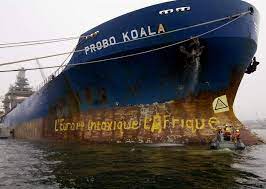By Kemo Cham
Victims of a toxic waste dump incident in Ivory Coast will now breath a sigh of relief after a regional human rights court ruled in their favour, 17 years after the deadly incident.
Scores of people lost their lives as a result of the 2006 incident when the multinational company, TRAFIGURA ordered the dumping of 528 m3 of toxic waste from refined crude oil in a district in the Ivorian capital, Abidjan.
TRAFIGURA, a Singapore based Dutch owned commodity trading group, hired the services of the cargo ship PROBO KOALA, which got authorisation from the Ivorian government to sail into the port of Abidjan. Through a third party, Trafigura commissioned a local company called TOMMY to dispose the contents of the vessel for a sum of US$17,000, the court heard.
The wastes were dumped by hired lorries in the open air at the Akouédo landfill site and around 10 other densely populated sites in the city.
A total of 17 people reportedly died after they inhaled toxic gases days later, while hundreds of thousands others suffered breathing and skin problems. The groundwater in the communities was also contaminated.
The Ivorian State later reached a controversial settlement agreement with the company which reportedly paid 95 billion CFA francs (US$150million) as damages and for clean-up operations.
Not only did that agreement exempt those involved from prosecution, but also majority of the victims didn’t receive any compensation, according to human rights campaigners.
A group of three human rights organizations comprising the Ivorian Human Rights League (LIDHO), the Ivorian Human Rights Movement (MIDH), and the International Federation for Human Rights (FIDH), brought the matter to the African Court on Human and Peoples’ Rights (ACtHPR) in 2016, challenging the contents of the agreement and seeking for all victims to receive their fair compensation.
On 5 September, 2023, the court made its ruling, in which it held the Ivorian state responsible for failing to protect human rights by preventing the disposal of the waste materials in the first place.
The State, the judges found, violated several human rights protected by the African Charter on Human and People’s Rights, including the right to life, health, and a satisfactory environment.
The Ivory Coast government, at the time under former president Laurent Gbagbo, was also found guilty of failing to offer adequate remedy after the incident. The authorities also deprived the people of information, the court said.
The ruling has been hailed by the campaigners who filed the case on behalf of the organization representing the victims – “Union des Victimes des Déchets Toxiques du district d’Abidjan et Banlieues (UVDTAB)”.
Alice Mogwe, President of FIDH, hopes that the ruling will prevent future disasters as well as connivance between businesses and governments in efforts to deprive victims of legal recourse when rights violations occur.
“This is a landmark decision of the African Court which clearly establishes the responsibility of the state for its failure to provide adequate compensation to individuals whose rights have been infringed by the wrongful acts of companies,” Mogwe stated.
For Lawyer Drissa Traoré, who is also Secretary General of FIDH, the focus now is on ensuring that the orders of the court are implemented.
“After all these years of mobilisation alongside the victims to obtain effective justice, we will continue our efforts to ensure that the Ivorian state complies with the decision handed down by the African Court on Human and Peoples’ Rights, and gives full satisfaction to the victims,” he said.
In its ruling, the court ordered the State to work, in consultation with the victims, to set up a compensation fund from TRAFIGURA’s settlement payment, within a year.
It also ordered for the agreement signed between the company and the state shielding people responsible from prosecution to be overturned, and for an “independent and impartial” investigation to be conducted and all those found wanted brought to book.
The Ivory Coast government must also implement legislative and regulatory reforms that prohibit the importation and dumping of hazardous waste on its territory, as well as liability of legal entities for waste dumping and other harmful environmental activities, according to the court.
Curiously, the Ivorian government in 2020 withdrew from a provision in the African Charter which allows individuals and NGOs to bring cases before the African Court. Mr Bamba of FIDH hopes that doesn’t prevent the government from adhering to the court’s orders.
“This decision is a reminder of the role and importance of regional justice in ensuring that States respect their human rights obligations. In the light of the serious human rights violations perpetrated against African populations, it is essential that the African human rights protection system be strengthened to provide an effective remedy for the too many victims who are still awaiting justice,” he said.
The use of Africa, particularly the Gulf of Guinea countries as dumping ground for waste products has been the subject of a longtime debate. They come in the form of either e-waste or plain toxic substances.
It is said to be a multimillion dollar industry involving middlemen who disguise the unwanted materials as reusable, only to illegally dump them under cover.
In some cases, as with Ivory Coast, it happens through legal channels.
In 2015, the Sierra Leone government under former President Ernest Bai Koroma was forced to distance itself from a plan to ship household wastes from Lebanon under an agreement with the Lebanese government.






















